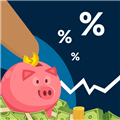5 Things to Know Before You Open a Savings Account
Ad Disclosure: This article contains references to products from our partners. We may receive compensation if you apply or shop through links in our content. This compensation may impact how and where products appear on this site. You help support CreditDonkey by using our links.
Everyone knows interest rates matter. But what less obvious factor could make or break your savings goals? Learn more below.
 |
Interest rates are high right now, so it's a great time to be saving. A high-yield savings account is a great option if you're looking to grow your funds while keeping them accessible.
CIT Bank Platinum Savings - 3.75% APY
- 3.75% APY with a balance of $5,000 or more
- 0.25% APY with a balance of less than $5,000
- $100 minimum opening deposit
- No monthly maintenance fee
- Member FDIC
But, before you jump in, let's talk about some important things to know. This way, you can avoid common pitfalls and make the most of your money.
#1: The best rates might be hiding in small places
It might be easy to stick with your current bank for a new savings account - familiarity breeds comfort, right? But traditional banks often don't have the best rates. In fact, the average national rate for savings accounts is only 0.39% APY.
Now consider this: many smaller banks and credit unions are currently offering rates over 5% APY. That's a massive difference that will help your money grow a lot faster.
These smaller institutions are just as secure as the big banks, thanks to FDIC insurance (or NCUA for credit unions).
To give you a head start, here are the current best savings rates available:
- Axos ONE:
Earn up to 4.21% APY - Valley National Bank:
High-Yield Savings Account - 3.90% APY - Mission Valley Bank:
High Yield Savings Account - 3.86% APY - Western Alliance Bank:
High-Yield Savings Premier - 3.80% APY - Live Oak Bank:
Personal Savings - Earn 3.80% APY - CIT Bank Platinum Savings:
3.75% APY - Quontic:
High Yield Savings - 3.50% APY - UFB Freedom Checking & Savings:
Unlock Up to 3.46% APY
Here's a quick calculator to see the difference in earnings between traditional and high-yield savings accounts.
#2: Read the fine print
Got your eye on an account with a sky-high APY? Double check the details.
That enticing rate could be a short-time promotional offer, or applicable only for specific balance tiers. Some accounts might even have deposit requirements to secure the higher rate.
Knowing these details is important. It helps you gauge the true long-term value of the account.
#3: Explore beyond regular savings accounts
There may even be better options than a regular savings account.
For example, if you can set aside money for a longer period, a Certificate of Deposit might be a better fit. The benefit of CDs is that they lock-in your APY. So even if the market dips, your rate won't.
CDs can be as short as just 1 month. Or if you're saving for far off goals, you can find long-term CDs and lock-in your rates for up to 10 years.
| Term | Bank and Yield Rate |
|---|---|
| 3 Month | Western Alliance Bank: |
| 6 Month | Quontic: |
| 1 Year | Western Alliance Bank: |
| 2 Year | Quontic: |
| 3 Year | Quontic: |
| 5 Year | Quontic: |
#4: You might not be able to get your money out at any time
Many savings accounts cap you at 6 withdrawals per month. After all, the goal is to save money, not spend.
Some banks remove this limitation. If quick access to your funds is important to you, you might want to look for that kind of option.
But if you're focused on growing your savings, a less accessible account might help curb the temptation to dip into your savings often.
#5: Some savings accounts might have fees
Some savings account (particularly at larger banks) may have a monthly fee if you don't maintain a certain balance. Fees can easily eat into any interest earned.
Besides monthly fees, there may also be other fees like overdraft fees and excess withdrawal fees.
Fortunately, most online banks don't impose monthly service fees. This lets you keep more of your money where it belongs—in your account, working for you and collecting interest.
Anything else to know?
One more tip: check the opening deposit requirement. Some banks ask for a large upfront sum, which might not be practical if you're just starting to save.
There are plenty of savings accounts with no, or very little, opening deposit. So just go for one of those instead.
And remember, you can open as many savings accounts as you need. Consider having separate accounts for different savings goals, like for an emergency fund, upcoming vacation, or home remodel. This not only organizes your finances, but also keeps you focused on your saving targets.
| APY | Minimum Deposit | ||
|---|---|---|---|
| Axos ONE | Up to 4.21%* on savings and 0.51% APY on checking | $0 | Learn More |
| Valley National Bank: High-Yield Savings Account | 3.90% | $1 | Learn More |
| Mission Valley Bank: High Yield Savings Account | 3.86% | $1 | Learn More |
| Western Alliance Bank: High-Yield Savings Premier | 3.80% | $500 | Learn More |
| Live Oak Bank: Personal Savings | 3.80% | $0 | Learn More |
| Western Alliance Bank: High Yield Savings Account | 3.80% | $1 | Learn More |
| CIT Bank Platinum Savings | 3.75% APY with a balance of $5,000 or more | $100 | Learn More |
| CIT Bank Savings Connect | 3.65% | $100 | Learn More |
| Quontic: High Yield Savings | 3.50% | $100 | Learn More |
Bottom Line
It's time to put your money to work! If you're still using a low-interest savings account, that's literally letting free money slip through your fingers. So why wait? Start comparing your options today and grow your savings effortlessly.
CIT Bank Platinum Savings - 3.75% APY
- 3.75% APY with a balance of $5,000 or more
- 0.25% APY with a balance of less than $5,000
- $100 minimum opening deposit
- No monthly maintenance fee
- Member FDIC
UFB Portfolio Savings - Earn up to 3.26% APY
- Earn up to 3.26% APY.*
- No monthly maintenance fees.
- No minimum deposit required to open an account.
- Access your funds 24/7 with easy-to-use digital banking tools.
- Enjoy peace of mind with FDIC insurance up to the maximum allowance limit – Certificate #35546.
High-Yield Savings Premier - 3.80% APY
- No account fees
- Option to open individual or joint account
- FDIC insured up to $250,000 per depositor
- Only $500 minimum opening deposit
High Yield Savings Account - 3.86% APY
- $1 minimum deposit
- No fees
- 24/7 online access to funds
- FDIC insured
Axos ONE - Earn up to 4.21% APY
- Earn up to 4.21% APY* on savings, and 0.51% APY* on checking when you meet requirements.
- Get your money up to 2 days early.
- No monthly maintenance, minimum balance, account opening, or overdraft fees.
High Yield Savings - 3.50% APY
- 3.50% APY
- $100 minimum opening deposit
- No monthly service fees
High-Yield Savings Account - 3.90% APY
- $1 minimum deposit
- No fees
- 24/7 online access to funds
- FDIC insured
Personal Savings - Earn 3.80% APY
- Earn 3.80% APY
- No minimum balance requirement
- No monthly service fee
High-Yield Savings Account - Up to $1,500 Bonus
- Select a savings offer and sign up: Choose and fund at least one high-yield savings account or CD on the Raisin platform to get started. Be sure to enter bonus code HEADSTART during sign-up to be eligible for a cash bonus.
- Deposit funds: The more you save, the more you can earn. Make a qualifying deposit(s) within 14 days of opening your account to set your bonus tier.
- Maintain your deposit(s): Maintain your deposit(s) for 90 days from your first deposit date to earn your bonus.
| Deposit | Cash Bonus |
|---|---|
| $10,000 - $24,999 | $70 |
| $25,000 - $49,999 | $175 |
| $50,000 - $99,999 | $350 |
| $100,000 - $199,999 | $750 |
| $200,000 or more | $1,500 |
Current Savings - Up to 4.00% bonus
- 4.00% bonus on up to $6,000 balance if you receive and maintain a qualifying direct deposit of $200 or more in a rolling 35 day period. (Otherwise, 0.25%)
- Simply add money to your Savings Pods and enable the Boost feature.
- Earn bonus on up to 3 Savings Pods, up to $2,000 balance each.
- Bonuses accumulate daily.
Note: This website is made possible through financial relationships with some of the products and services mentioned on this site. We may receive compensation if you shop through links in our content. You do not have to use our links, but you help support CreditDonkey if you do.










